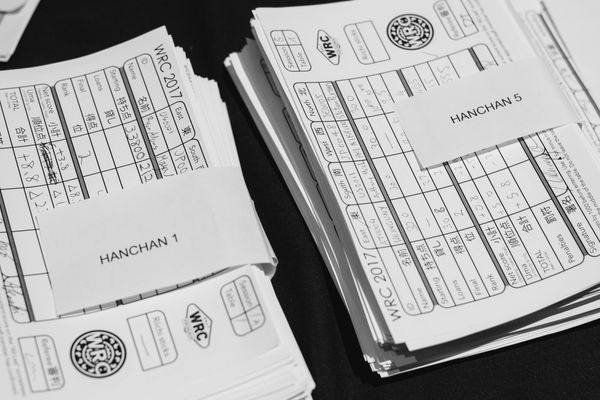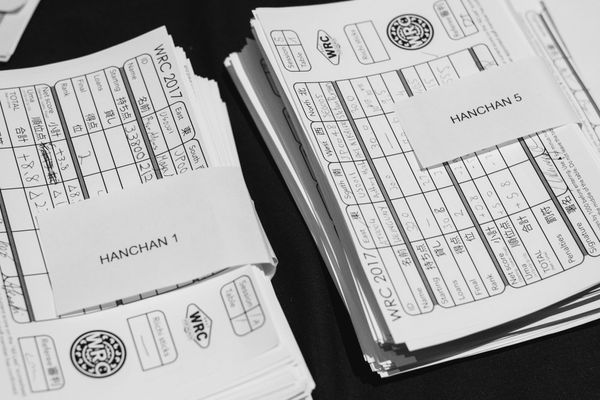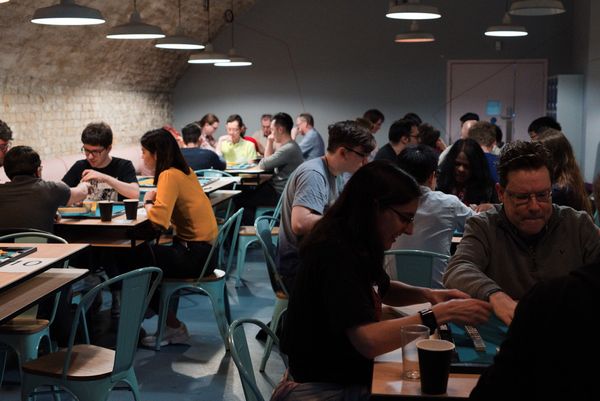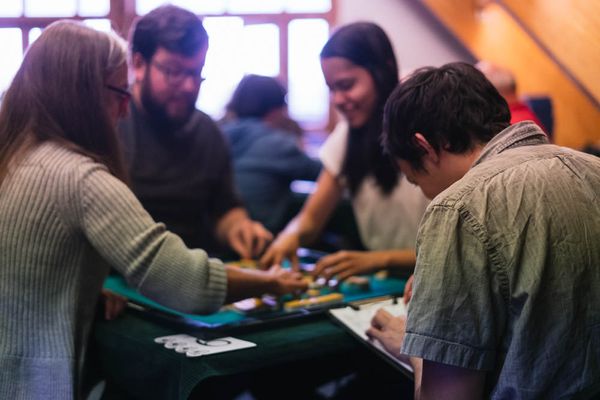What I talk about when I talk about running tournaments (completed)
If you are part of a mahjong-playing community, as opposed to grinding on 0000 in a vacuum all day, only pausing between matches to take a swig of your bottled green tea, I’m sure by now you’ll have played in several tournaments. Well, I’m fairly certain of it. There’s a pretty reasonable chance. At the very least, you may or may not have heard of someone talking about organizing one but never getting round to it.
Riichi mahjong tournaments outside Japan are still rather uncommon, so when we decided to hold online tournaments for fun, we had no idea where to begin – tournament formats, timing, etc, as well as taking into account having an event of reasonable length without needing multiple sessions, how players qualify and are eliminated, time zones, and other considerations. Of course we could have just taken a page from the Japanese and- well, actually we had no idea how they did it, and still don’t to this day. All we had was a bunch of players, an IRC channel and most importantly, absolutely no clue what a regular tournament format looked like. This is known in business management as “blue sky thinking”, or “making shit up”. However we had no lack of ideas on how things could be done, and so we embarked on a highly experimental journey of dreaming up and implementing different tournament formats.
Oh right, I forgot to mention. The first ever tournament we held was simple, using the tenhou tournament insta-mix where you just add people. If you are unfamiliar with the format, you can play any number of games with people in a common queue, a game starts as soon as there are four people in a queue. Players are ranked based on the total scores of their best 3 (or 5)-game sequence. So if you played 5 games in total and got +30 -50 +40 +20 -10 respectively, only the last 3 games in a row would be counted for a total of +50.
This is a decent format when you have a lot of people. Matches are constantly starting and ending, and some players may not queue immediately after finishing, so you will more often than not get different opponents for each game. As everything is automatic, there are no fiddly bits like manually matching up players or being held up by a slow game, and everyone can play at their own pace.
However, the issues with this system are rather obvious. One bad round can ruin two (or even four) high-scoring rounds, leaving you to start all over again. After having one or two promising runs junked, players will be left frustrated and angry, to put it mildly.
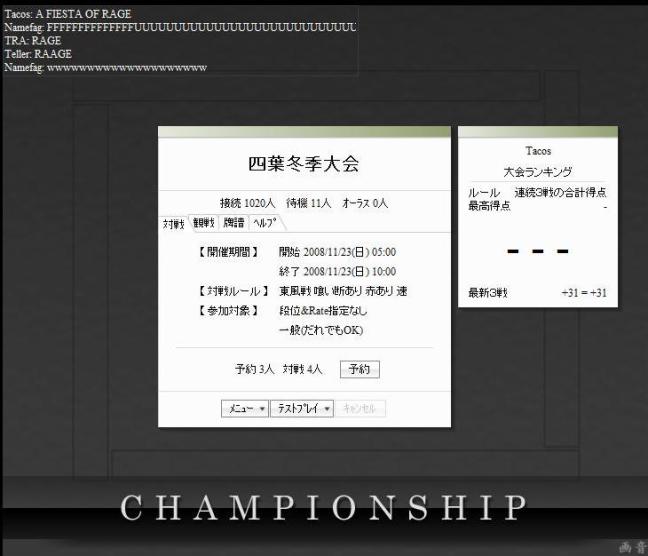
Problems are exacerbated when you only have a limited number of players. If too few games are running, people finishing one game will often click on the queue button to coincidentally find themselves playing the exact same people. And when players leave, there are always stragglers needing one round to finish to free up opponents.
But even more than this, there was a little something irking me about the system. If it were, say, a 24-hour tournament, a more determined person with loads of time to spare would be able to keep grinding away until he got a higher score. This is a positive in a sense – it’s never game over even after a bad run, so you still have everything to play for – however it kind of gnawed at me that a person who had more time to waste than me would have many more chances to score higher and higher. Perhaps you may feel that his perseverance merits this, but then who would want to say “to win this mahjong tournament you must have confidence, skill, talent, and nothing else to do for 24 hours”? It’s true that mahjong has a huge luck element, but even if I only play 3 rounds for a total of -135, there’s no way I will feel that the eventual winner beat me fair and square, or even that he’s the best of the bunch. There’s a sense of detachment from the spirit of heated competition, more like a pinball high score table than a showdown of epic proportions.
And so after the fiesta of rage it was agreed that we would never use this format again.
Later on, we discussed what we wanted to see in future tournaments, and by discussing I mean I bullied everyone into acceding to my views. The thing about a tournament, casual or not, is that it’s not for only the eventual winners or the players with more skill, but for every single participant. You want everyone to come in knowing they have a decent shot, even if their performance is a little shaky early on – it’s not game over if you don’t come out red hot in the first match. And more importantly, it doesn’t leave stragglers who failed miserably in the early rounds and have to play through the later rounds full of despair and anguish. That kind of shit is infectious.
Personally I feel that the EMA tournament rules are decent enough in dealing with that particular issue, they just sum up all your scores after uma = da winnar! so you do get a chance to make up a deficit with a huge score later. drob thinks otherwise though, according to him it’s even more of a slippery slope after you lose the first one. He’s the one with the tournament experience, but it takes more than people with real life contrary experiences to change my mind, so I’ll leave this paragraph hanging here with no apparent conclusion.
Following that, we went with what would eventually evolve into our current tournament format.
3 han chan rounds, with all uma modifiers removed, all scores added up, cut to top 4, single match final table.
The system we rolled out was intentionally more lenient, very soft even on bad decision-making play and encouraged more playful, just-a-little-bit-more gambling instead of straight-up tight grinding to eke out a win. I was one of the people pushing for this, because some of us were already grinding our way up the ranks, but this was the exception rather than the norm. The skill difference between a beginner and an intermediate-level player is way bigger than intermediate vs expert. If nothing else, I wanted to see someone do absolutely horribly in earlier rounds and make a comeback in amazing fashion. And it happened. Temeraire went +5500 +10000 but then made a huge +73600 third match to bust into the final four.
I feel the thing about a mahjong showdown is you really really want such a thing as a final table to finish the event no matter what. Getting to play the finalists face to face for the ultimate prize is so much more different than bringing a lead of +25000 or a deficit of -7000 to a final round match with a bunch of random players whose tournament placings are, let’s face it – largely irrelevant.
Making qualifying cuts for the next round and surviving elimination is one thing. When there are winning players, there are losing players. As long as the cuts are not crazy steep, like eliminating 150 out of 200, as long as you play a solid winning game, don’t worry, you’ll be in. But good players needing to outscore other good players for the top spot isn’t really my cup of tea.
Imagine how the way people with a chance at winning it all must feel, during the final round. Let’s say I am in the lead with 2000 points above the next player. Do I play it safe and go for a fast low-scoring first place? Against a riichi when I am dealer as top in ii shan ten, should I risk dropping to 3rd in a bid to go for another renchan? Every point counts in these situations, and these are never easy decisions to make because they relate to something out of the game itself, and there is no clear-cut way to know where you are, save running over to the other tables to check up on how the other contenders are doing. At the end of the day, finalists need clearly defined objectives to fulfill and the power to directly influence the results, regardless of whether they succeed or fail – you owe them that much, at least.
Win the last match.
Be in the top half of the field to make the cut.
Score 100000 points in the last match to survive with your horrible current total.
All the above are reasonably-defined objectives. Even if you aren’t sure whether you made it in #2, most of the time you’ll have a pretty good idea where you are.
“Score more points than 3 or 4 other people with similarly high scores playing at other**tables to win the championship” is one of the worst-defined objectives ever. Is winning the last round with 35000 good? Not safe enough for you? What are you gonna do when you tsumo the winning tile then? Cut it and go for a single wait on the dora?
I don’t know why I segued into this rant.
Nowadays since everyone’s much better, we put back the uma and do multiple-round cuts into a two-hanchan final table. One great thing about this system is you can easily stretch to accommodate more or fewer participants at short notice, which is important for an online tournament. Elimination is easily handled because everyone is online, and there are a wealth of things to do on the internets. Surprisingly, many of the players who miss the cut do stick around to watch the finals and yell at the tiles. We are still thinking up ways to mess up the format though, and are considering swiss-style matching of opponents, as well as other minor adjustments. We’re rather due for a tournament soon, and will probably have one when Alvin finds the time.
Since there’s no good way to end this I’ll do it with some tournament-related quotes.
[00:06] <&Krynn> if gentei wins he can receive a fabulous ban as his prize
[21:55] <@Alvin> admittedly this is going smoother than I thought it would
[21:55] <@Alvin> even though it isn’t going smooth at all
[21:50] <+ronronronronron> i knew id get my fill of rage in round 2 fff
[17:41] <@Alvin> ARE YOU GUYS PUMPED FOR THE TOURNEY OR WHAT
[17:41] <@Temeraire|Preparation> What do you THINK
[17:41] <@osamu> why do you need to prepare
[17:41] <@Temeraire|Preparation> I’m preparing by reading Detroit Metal City
[00:05] <+Speedwagon> morning GenteiJanken
[00:05] <@Alvin> get in on dis
[00:05] <+GenteiJanken> sorry I’m late ;;
[00:05] <@Alvin> it’s cool
[00:05] <@UmaiKeiki> genteis early
[00:05] <@Alvin> everyone is late
[00:05] <+GenteiJanken> phew
[00:05] <@Krynn> !time adelaide
[00:05] <%Yukio> 8:36am Saturday (CST) – Time in Adelaide, South Australia
[00:05] <+phrosen> GENTEI WE STARTED ALREADY
[00:05] <+phrosen> UR OUT
